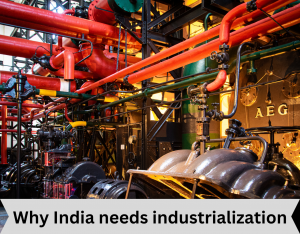ForumIAS announcing GS Foundation Program for UPSC CSE 2025-26 from 27th May. Click Here for more information.
Source: The post challenges with India’s service-driven growth has been created, based on the article “Why India needs deep industrialization” published in “The Hindu” on 14th February 2024.
UPSC Syllabus Topic: GS Paper 3 – Indian Economy- changes in industrial policy and their effects on industrial growth.
News: The article discusses India’s struggle with industrial growth and high unemployment. It critiques the focus on high-skill, service-based growth, arguing it increases inequality and neglects mass education, which is essential for successful industrialization and overall economic development. Why India needs deep industrialization
What are The Factors Affecting India’s Industrial Growth?
Stagnant Manufacturing Sector: Manufacturing has consistently been below 20% in output and employment for 75 years.
Ineffective 1991 Reforms: These reforms, aimed at labor-intensive industrialization, failed to significantly boost the manufacturing sector.
High Unemployment: Persistent unemployment issues, including chronic disguised unemployment, reflect industrial challenges.
Widening Trade Deficit: Driven by an increase in imported goods, indicating a lack of domestic manufacturing capacity.
Shift to Service-Based Growth: Since the late 1980s, the focus has been on high-skill, service-driven growth, which hasn’t absorbed labor from agriculture effectively.
Neglect of Mass Education: Emphasis on higher education at the expense of mass schooling has led to a workforce not adequately equipped for industrial jobs.
Cultural Impact on Industrial Growth: Cultural factors, such as the undervaluing of certain vocational skills (like electrical and welding work), have hindered the development of the manufacturing sector.
Why is Deep Industrialisation Important for India?
Broad-based Employment: Deep industrialization offers more employment opportunities, absorbing labor from sectors like agriculture, unlike the limited absorption capacity of service-driven growth.
Economic Stability: A strong industrial base can lead to more stable economic growth and reduce dependence on imports, addressing India’s widening trade deficit.
Skill Development: Industrial growth encourages the development of a wide range of skills, benefiting from a focus on both vocational and higher education.
Innovation and Efficiency: Deep industrialization fosters innovation, leading to increased efficiency and competitiveness in the global market.
What are The Challenges with India’s Service-Driven Growth?
Limited Employment Absorption: Service-driven growth since the late 1980s couldn’t adequately absorb labor exiting agriculture, unlike manufacturing.
Requirement for High Skills: The service sector demands a highly skilled workforce, which India struggles to supply due to educational inequalities.
Increased Inequality: Service sector growth leads to higher inequality. The Gini index for regular wages in services is 44, compared to 35 in manufacturing.
Neglect of Mass Education: A focus on higher education over mass schooling contributed to a workforce ill-equipped for service sector jobs.
Elite Dominance: Higher education institutions fostered elites who advanced in the IT sector but contributed to stagnation in broader industrial areas.
Limited Rural Entrepreneurship: Compared to countries like China, India’s poor human capital endowment in rural areas hampers entrepreneurship, crucial for service sector growth.
Read More UPSC Topics-
On HAPS (High-Altitude Pseudo-Satellite vehicles) |
Retail Inflation in India |
What Should be Done?
Diversify Industrial Strategy: Instead of solely focusing on high-skill, service-driven growth, India should diversify its industrial strategy to include and boost manufacturing.
Address Educational Inequality: Tackling the disparity in education quality between rural and urban areas, and among different social classes, is vital to creating a more equitable and capable workforce.
Support Rural Entrepreneurship: Encouraging entrepreneurship in rural areas can help absorb labor from agriculture and contribute to more balanced economic growth.
Cultural Shift in Work Value: Cultivating a culture that respects and values all forms of work, including manual and vocational labor, is essential for comprehensive industrial development.
Question for practice:
Examine the factors contributing to India’s struggle with industrial growth and high unemployment, as well as the challenges and potential solutions associated with its service-driven economic model.





